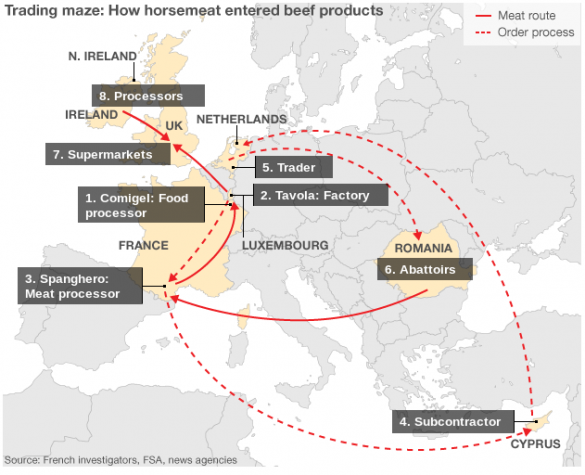The daily revelations emerging from the discovery of horsemeat in lasagna purchased in Ireland reveal the complexities of our food system. When EU health commissioners tracked down the source of the horsemeat, they found a trail that passed through multiple countries, processors, dealers, brokers, Romania, England, Cyprus, Poland, the Netherlands, and in some cases, through illegal hands.
Since much of our meat is processed, ground up, blended with flavorings, shaped into meatballs and stuffed into sausage casings, each step closer to our plates creates opportunities for processors to succumb to pressures from consumers who want cheaper meat in poor economic times. And this poses a challenge to regulators and concerned consumers who want safe and uncontaminated food.
The current kerfuffle about horsemeat Europe’s food supply chain reveals our persistent concern over what one Victorian writer, Andrew Wyntner, called “culinary poisons.” And todays heightened awareness of food sourcing only raises the steaks over public confidence in our global food system. Frederick Accum wrote in 1820 about food adulteration that he found so ubiquitous in Victorian London. Later, in 1848, John Mitchell lauded the advances in the uses of chemistry to detect the addition of substances that “diminished its real strength without altering its apparent strength. He called this kind of adulteration “the deadly kind.” Andrew Wyntner in “Our Peck of Dirt” claimed German sausages were so contaminated that he called them “poison bags.”

Photo source: http://eluminix.linuxbsdos.com/horse-meat-gate-sweeping-across-europe/
The discovery of horsemeat in Ireland was upsetting on several levels. Not only did the revelation raise questions about food safety and transparency, the mingling of equine with bovine clashes with cultural identities. The British have never been that keen to eat horses while the rest of Europe has assimilated horsemeat into its culinary repertoire. The consumption of horsemeat in France was legalized in 1866 on the eve of the Siege of Paris. While the French have Escoffier included horsemeat in his repertoire claiming that, “Horsemeat is delicious when one is in the right circumstances to appreciate it.” Clearly, he wouldn’t approve of the current circumstances.
Author